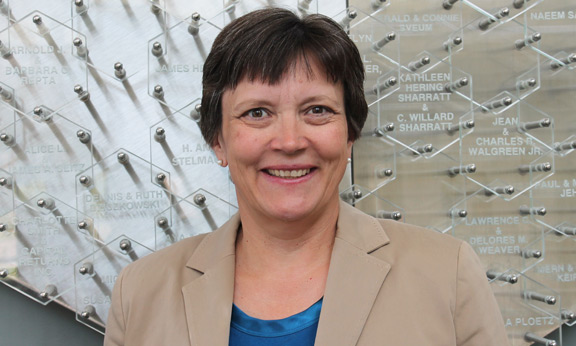
Mary Hayney, professor (CHS) in the Pharmacy Practice Division, is co-PI with Freddy Caldera, DO, School of Medicine & Public Health (SMPH), on a 2017 Pilot Award from the UW Institute for Clinical and Translational Research (ICTR).
Their proposal titled “Identifying Inflammatory Bowel Disease (IBD) Patients with Altered Immunity at Risk for Herpes Zoster” will focus on IBD and immunosuppressive therapy. IBD is a group of chronic inflammatory disorders of the gastrointestinal tract. Immunosuppressive therapy is the cornerstone of treatment for IBD, which while effective, increases the risk for infections, including Herpes zoster (HZ). HZ is caused by reactivation of varicella zoster virus (VZV) which can occur when T cell function declines. HZ is preventable with immunization. Hayney and Caldera postulate that IBD patients have altered cell-mediated immunity, which increases their risk for HZ. This study will determine whether having IBD alters VZV cell-mediated immunity (CMI), which could lead to increased risk of HZ in this population. If the IBD cohort has lower or equivalent CMI, they would suggest universal HZ immunization for all IBD patients older than 40 years. Additional project collaborators include Arnold Wald and Sumona Saha from SMPH.
Highlighting the strength of the UW-Madison School of Pharmacy collaborations in innovative clinical and translational research, Hayney’s and Caldera’s work was among nine projects selected for a Translational Basic & Clinical Pilot Award. These awards address translational basic discovery activities (biological, social, behavioral mechanisms that underlie disease); development of biomarkers, target and lead molecules, and devices (mechanical, computational); preclinical and animal models; translation of discovery to patients (new diagnostic, treatment, and prevention methods; Phase 1 and Phase 2 clinical trials). Recipients receive up to $50,000 support for 12 months.
Hayney’s research interests include host response to vaccination and protective effects, especially as they relate to immunosuppressed individuals. In addition Hayney has a clinical practice in lung transplantation at the University of Wisconsin Hospital and Clinics.